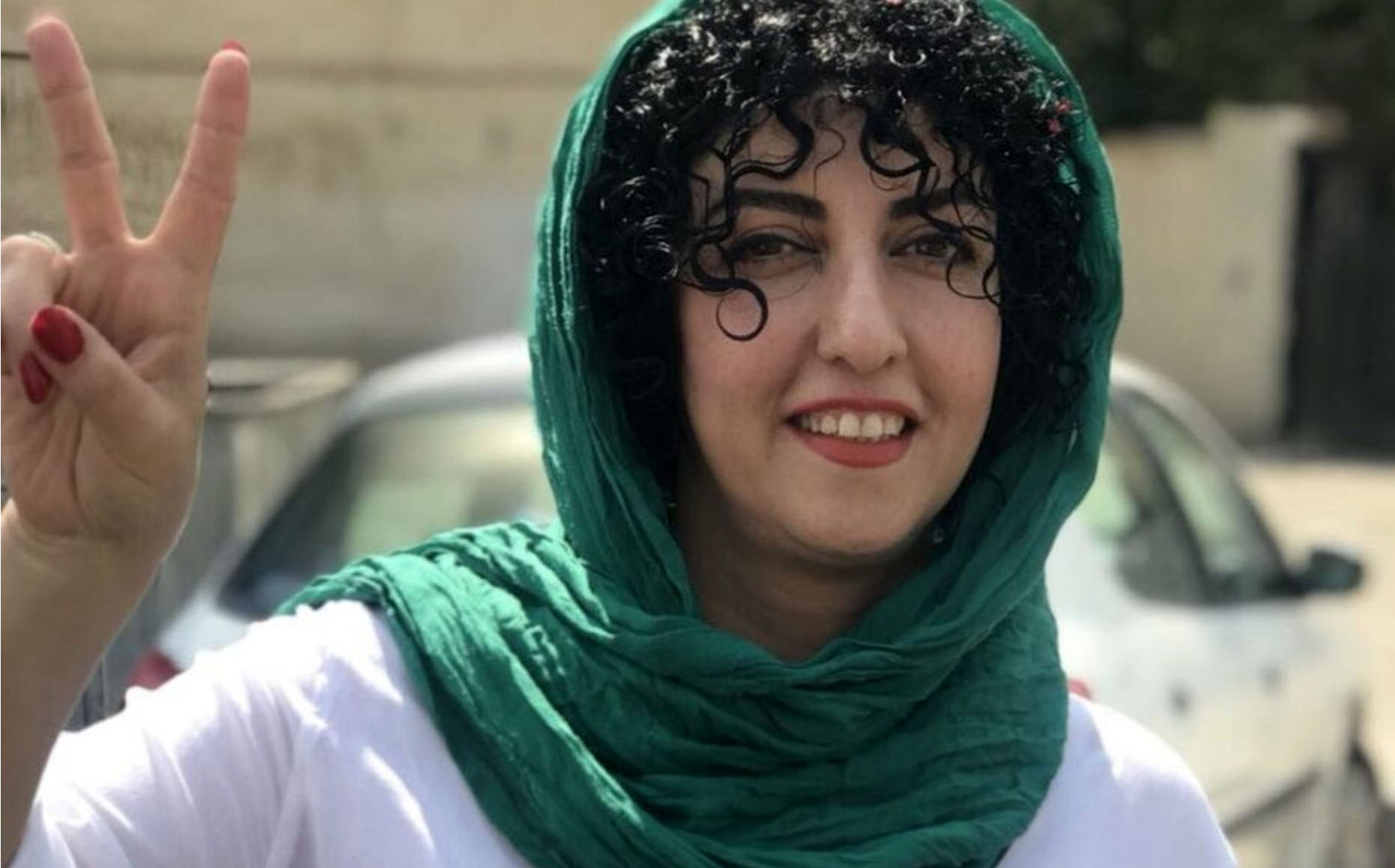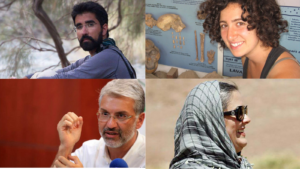برای خواندن این مطلب به فارسی اینجا را کلیک کنید
PEN America last week announced Iranian journalist and fervent advocate for human rights Narges Mohammadi as the recipient of its esteemed “Freedom of Writing” award. Mohammadi was officially honored with the award during the association’s annual exclusive event at the New York Museum of Natural History on May 18. The news of this award has met with elation from other human rights activists in Iran, as it not only sheds light on Mohammadi’s incarceration in Evin prison but also can help garner more international attention on human rights issues in Iran.
In a statement on May 15, Suzanne Nossel, the Chief Executive Officer of PEN America, hailed Mohammadi as a global beacon of inspiration. She stated, “We are proud to honor this fearless truth-seeker whose defiance has made her an emblem of resistance against oppressors.” Nossel also referenced the wide-scale protests by Iranian women in recent months, suggesting that Mohammadi’s courage has inspired a new generation. Nossel also acknowledged the heartbreaking sacrifices Mohammadi and her family have made, framing her as a hopeful figure guide for freedom of expression for writers, artists, and journalists in one of the most repressive nations.
With Mohammadi currently incarcerated by the Islamic Republic, her husband, Taghi Rahmani, attended the ceremony and accepted the award on her behalf.
PEN America’s “Freedom of Writing” award is dedicated to writers who have endured suppression and imprisonment due to their written works. Prior recipients of this award include Kesu Xiong, a civil rights advocate and former professor at Peking University who was sentenced to 14 years in prison in China for “subversion,” and Vladislav Yesipenko, a freelance Ukrainian journalist with Radio Free Europe/Radio Liberty who was detained by Russia in the Crimean Peninsula two years prior.
Mohammadi has been an ardent defender of women’s rights, political prisoners, and minorities for over two decades. Her initial arrest was a result of writing an article about women’s rights and participating in a political demonstration during her university years. As acknowledged by PEN America, Mohammadi’s writings, interviews, and social media activities have drawn global attention to human rights violations and the mistreatment of prisoners. In 2022, Mohammadi unveiled shocking accounts of physical and psychological torture inflicted on prisoners in Iran through her book, “White Torture”, per the statement from the association.
At the age of 51, Mohammadi has faced severe penalties during her lengthy imprisonment, including torture and solitary confinement. She had a brief release from prison in 2020 after serving eight and a half years for various convictions, including “creating illegal organizations” and “conspiracy against the regime.” Mohammadi once held the position of Vice President of the Human Rights Defenders Center, which has since been disbanded by the Iranian government.
Narges Mohammadi’s UNESCO Award Recognition
This is not the only award Narges Mohammadi has been recognized with recently. Mohammadi, along with Niloufar Hamedi and Elaheh Mohammadi, were bestowed with the prestigious World Press Freedom Award from UNESCO on May 1st this year. The trio’s remarkable commitment to truth and accountability led to their recognition, as announced by the United Nations on May 1st, for this top-notch award in the sphere of press freedom.
The “Freedom of the Press Guillermo Cano” award announcement came during a ceremony orchestrated by UNESCO. Tofigh Jalasi, Director of the UNESCO Communication Office – a branch of the UN focusing on culture, science, and education – announced the awardees, expressing hopes to personally present the award “when circumstances permit, to these three courageous journalists”. He voiced UNESCO’s aspiration that the award would not only spotlight the professionalism of these female journalists but would stimulate global initiatives to ensure the freedom of journalists, particularly women, to courageously speak the truth and expose corruption and human rights infractions.
Zainab Salbi, who leads the International Professional Media Council and nominated the trio for the award, observed: “The price paid by these three for their dedication to truth-telling and publishing has been considerable. Therefore, we are resolved to honor them and ensure their voices reach the global audience until they are safe and free.”
Narges’ Message from Prison for the UNESCO Award
While still incarcerated in Evin prison, Mohammadi conveyed a message to the award ceremony when the UNESCO Human Rights Prize winners were announced. She wrote: “News of the UNESCO Freedom of Expression Award reached me in prison, at a crucial time when I was facing a new case with numerous charges. Similar to the previous three courts, I’ve declared that I will not attend any court proceedings as I do not acknowledge the Islamic Republic’s government. Their autocratic, religious, and misogynistic rule is something I aim to resist and change.”
In her message, Mrs. Mohammadi made reference to UNESCO’s 2030 sustainable development document, a roadmap endorsed by world nations during the 2015 United Nations General Assembly, but rejected by Ali Khamenei, Iran’s Islamic Republic leader.
In alluding to this document, she stated: “Despite the document stressing the empowerment of all women and girls and efforts towards gender equality, female students in Iran have suffered exposure to chemical gasses for months. The government is endorsing a policy to deter girls from education by invoking fear… The 2030 document advocates public access to university education. Yet, Iran’s Baha’i youth are kept from education through oppressive methods, and other young people and children are deprived of education due to poverty, exorbitant costs, unemployment, and despair.”
Further in her message, Narges Mohammadi underscored the importance of free speech and its role in safeguarding human rights, along with the impact of civil society in promoting social justice. In conclusion, referencing recent national protests, she appealed to the attendees of the UNESCO Freedom of Expression and Journalism Award ceremony: “Please don’t leave us isolated. When forming your policies, consider supporting ‘civil society’, the ‘people’ demonstrating on the streets, ideological ‘prisoners’, those facing ‘execution’, and the protesting citizens and political activists. To further the peaceful, non-violent objectives of the Iranian people, curtail the government’s power to repress, as well as the agents enforcing imprisonment, torture, and execution.”
Narges Mohammadi Receives Olof Palme Award
Narges Mohammadi was also awarded the prestigious Olof Palme Award on January 9, 2023. The Olof Palme Foundation, in their press announcement, highlighted Mohammadi’s significant role in advocating for women’s rights and freedom of speech in Iran.
Alongside Mohammadi, the Olof Palme Foundation recognized Marta Chumalu, a Ukrainian feminist, and Eren Keskin, a Turkish lawyer and human rights activist, as fellow recipients of this year’s award. The award, commemorating Olof Palme, a former Swedish prime minister and human rights advocate, is given yearly to one or more human rights activists globally. Palme, a vocal critic of the Vietnam War and fierce critic of the South African apartheid regime, was assassinated in 1986.
Reporters Without Borders Honors Narges Mohammadi
Approximately a month prior to Mohammadi receiving the Olof Palme Award, Reporters Without Borders acknowledged her as one of their Press Freedom Award winners in recognition of her bravery. The statement applauded Mohammadi’s continuous fight for press freedom and human rights, leading to her repeated imprisonment over the last twelve years.
Towards the end of the previous year, the BBC also listed Narges Mohammadi as one of the 100 most inspiring and influential women worldwide in 2022. Mohammadi has been unwavering in her efforts, both within and outside prison walls, to shed light on the injustice facing the people of Iran. She has been incarcerated multiple times for striving to enhance the living conditions of Iranian citizens and for documenting human rights abuses by the Islamic Republic. Her recent statements from prison demonstrate her enduring resilience against oppressive forces and security institutions.
Back to top

